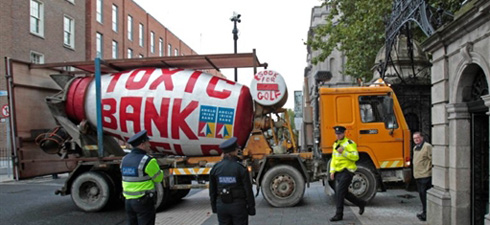From Greece to Japan to the US, countries across the world have been devastated by the banking crisis. But no economy has been wrecked quite so brutally as Ireland's. The erstwhile Celtic Tiger has seen its national income shrink 17% over the past three years – the deepest and swiftest contraction of any western country since the Great Depression. At the height of the long boom from 1990 to 2007, property in Dublin was worth more than in London. Since then, prices have dropped by around 40% – and are still sinking. At this rate, the country will soon hold the dubious honour of hosting the biggest property bubble and bust in modern history. When financiers joked in 2008 that the only difference between bankrupt Iceland and hard-up Ireland was one letter and a few days, they got it wrong – the mess the Emerald Isle is now in is so much worse.
And all the way down, Dublin ministers have promised voters that things are about to get better. Those emergency loans to the banks – that would sort it. These savage spending cuts – that would do the job. That decision to pretty much guarantee the entire banking system (with practically no questions asked) – this time for sure. Wrong, wrong, wrong. Like a body flung off the roof of a skyscraper, the Irish economy has just kept on falling.
They were at it again yesterday. The Irish finance minister, Brian Lenihan, promised voters that the national "nightmare" they have had to live with for the past couple of years would soon be over: "We are now bringing closure to that." He did not convince financiers, who have heard a similar form of words from Mr Lenihan every time he has brought forth another ill-advised plan. Even measured against the minister's previous gambles, though, this one is huge. Yesterday's bailout will include Anglo Irish, the property developer's favourite bank, as well as Allied Irish and Irish Nationwide – and it is set to raise the budget deficit from around 12% of national income to an astounding 32%. Read full article in the Guardian...
Press reaction
Ireland's grief over “Black Thursday”
Following the September 30 announcement that the Irish bailout of its toxic banks could hit €50bn, the press is vehement – in particular the tabloids – over what has become known as “Black Thursday.” “Ireland RIP” leads the Irish Daily Star, which says the country will face “decades of financial hell” because of “greedy bankers and gormless politicians”. While The Irish Daily Mirrorleads with “Greedy, Rotten Liars”, The Irish Sun is calling for Ireland’s rogue bankers to be tried for “treason”, calculating that the bill will cost €10,000 for each man, woman, and child in the country.
“Even though the figure was not terribly different to what was expected when it finally arrived, like a death in the family, it was heartbreaking and overpowering in equal measure,” writes Irish Examiner. The Cork daily starkly warns that “either we accept our situation and deal with it or we waste energy fighting each other and, inevitably, finish the job of destroying this country.” The Irish Independent similarly argues that “it is much better to know the hard facts… The markets would not look kindly on a softening up of a clearly defined recovery plan.”
The Irish Independent’s maverick right-wing columnist Kevin Myers look at things from his own highly personal angle. Accusing his fellow country of miserabilism, he argues that, “Our debt is daunting but it is nothing compared to the tasks China faced after Mao.” Germany is another example he cites. Pointing out that on September 29 Germany repaid the last of the reparations for World War One, he writes, “The Germans did in the 1920s, what they were later to do in the late 1940s and 1950s, and again in the 1990s. They Got On With The Job.”
Was this article useful? If so we are delighted!
It is freely available because we believe that the right to free and independent information is essential for democracy. But this right is not guaranteed forever, and independence comes at a cost. We need your support in order to continue publishing independent, multilingual news for all Europeans.
Discover our subscription offers and their exclusive benefits and become a member of our community now!












